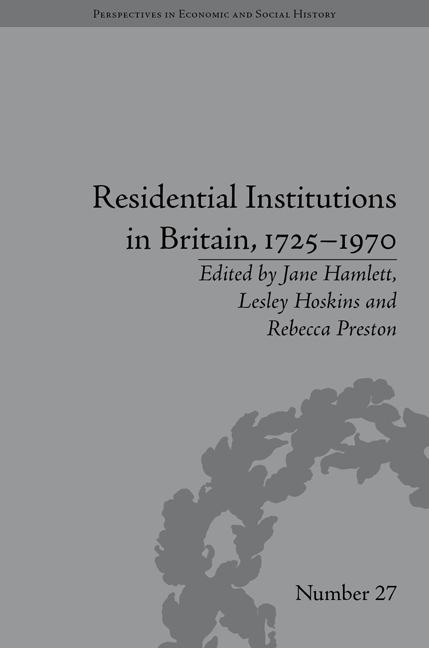Book contents
- Frontmatter
- Contents
- Acknowledgements
- List of Contributors
- List of Figures
- Introduction
- 1 Viewing the Early Twentieth-Century Institutional Interior through the Pages of Living London
- 2 ‘French Beef was Better than Hampstead Beef’: Taste, Treatment and Pauperism in a London Smallpox Hospital, 1871
- 3 From Asylum to Mental Hospital: Gender, Space and the Patient Experience in London County Council Asylums, 1890–1910
- 4 Refuge or Prison? Girls' Experiences of a Home for the ‘Mentally Defective’ in Scotland, 1906–1948
- 5 Paupers and their Experience of a London Workhouse: St Martin-in-the-Fields, 1725–1824
- 6 ‘A Veritable Palace for the Hard-Working Labourer?’ Space, Material Culture and Inmate Experience in London's Rowton Houses, 1892–1918
- 7 ‘The Place was a Home from Home’: Identity and Belonging in the English Cottage Home for Convalescing Psychiatric Patients, 1910–1939
- 8 ‘The Father and Mother of the Place’: Inhabiting London's Public Libraries, 1885–1940
- 9 ‘Discipline with Home-Like Conditions’: The Living Quarters and Daily Life of the Women's Army Auxiliary Corps in First-World-War Britain and France
- 10 Halls of Residence at Britain's Civic Universities, 1870–1970
- Notes
- Index
2 - ‘French Beef was Better than Hampstead Beef’: Taste, Treatment and Pauperism in a London Smallpox Hospital, 1871
- Frontmatter
- Contents
- Acknowledgements
- List of Contributors
- List of Figures
- Introduction
- 1 Viewing the Early Twentieth-Century Institutional Interior through the Pages of Living London
- 2 ‘French Beef was Better than Hampstead Beef’: Taste, Treatment and Pauperism in a London Smallpox Hospital, 1871
- 3 From Asylum to Mental Hospital: Gender, Space and the Patient Experience in London County Council Asylums, 1890–1910
- 4 Refuge or Prison? Girls' Experiences of a Home for the ‘Mentally Defective’ in Scotland, 1906–1948
- 5 Paupers and their Experience of a London Workhouse: St Martin-in-the-Fields, 1725–1824
- 6 ‘A Veritable Palace for the Hard-Working Labourer?’ Space, Material Culture and Inmate Experience in London's Rowton Houses, 1892–1918
- 7 ‘The Place was a Home from Home’: Identity and Belonging in the English Cottage Home for Convalescing Psychiatric Patients, 1910–1939
- 8 ‘The Father and Mother of the Place’: Inhabiting London's Public Libraries, 1885–1940
- 9 ‘Discipline with Home-Like Conditions’: The Living Quarters and Daily Life of the Women's Army Auxiliary Corps in First-World-War Britain and France
- 10 Halls of Residence at Britain's Civic Universities, 1870–1970
- Notes
- Index
Summary
Paltry Feasts
The workhouses of London ‘have their enjoyments’ at least one day of the year, the Morning Post reported in 1872, and accordingly at Christmas patients of the Metropolitan Asylums Board (MAB) received their special feast. Imbecile inmates at the asylums were provided with roast beef, plum-pudding, beer, fruit, tobacco and snuff as well as ‘other luxuries in celebration of the festival’ in ‘hand-somely decorated’ surroundings. Residents of the infectious hospitals operated by the MAB, meanwhile, made do with ‘such maimed rites as the necessity of the various cases demanded’. Paupers benefitted from the honoured tradition of treating the destitute to a sumptuous Christmas repast. Newspapers conventionally reported on enormous quantities of food lavished on paupers that merry day and sometimes wondered if the ‘workhouse system cannot be so very bad which permits, and in fact sanctions, the annual Christmas feast for the poor’. Yet, as everyone must have known, this single and circumscribed day of generosity merely marked a temporary suspension of the year-round rule of parochial austerity. The smug hypocrisy of the festivity formed a central theme in George R. Sims's very popular poem, ‘In the Workhouse: Christmas Day’. In it, an old male inmate explains why ‘a penniless pauper spits on your paltry feast’: his wife had starved to death the previous Christmas because the parish would not allow her bread at a crucial moment.
- Type
- Chapter
- Information
- Residential Institutions in Britain, 1725–1970Inmates and Environments, pp. 35 - 50Publisher: Pickering & ChattoFirst published in: 2014



